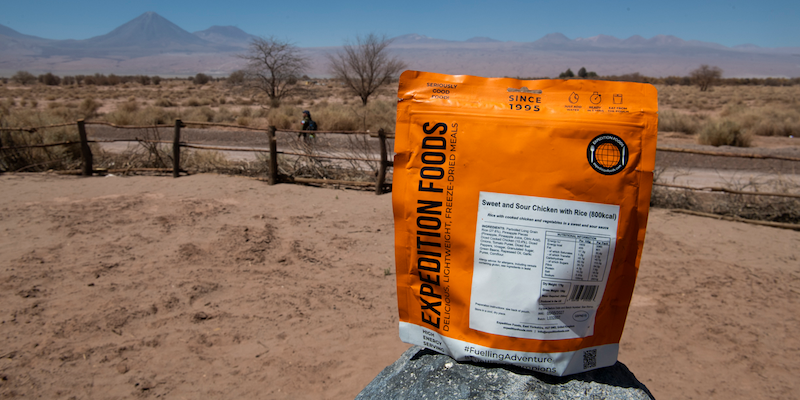-
Meals
-
Ration Packs
-
Special Diets
- Survivor Foods 25-Year Tins
-
Snacks, Drinks & Accessories
- About Us
Meet Jo Meek, the Fastest Ever British Female at the MDS
January 13, 2020
Expedition Foods (EF): Tell me about your background, have you always been a runner? How did you get started?
Jo Meek (JM): I was not a runner, or even remotely athletic, as a youngster but by late teens/early 20s I had started. I wanted to lose weight initially but soon got hooked.
I have now been a runner for 20+ years so it’s very much part of my life. I started off road running but then joined a club and soon found my love of competition which I still have.
EF: When did you get into trail running?
JM: Although I raced cross country early on and sometimes trained off road, I did not actively seek out trail runs until much more recently. I did the odd local trail race but that was about it. Since moving up to the ultra-distance I have embraced trail running and love runnable trails.
EF: When did you decide to compete in the MDS?
JM: The idea had been bubbling away in the background for a few years but in 2013 it came to fruition. I always felt I should not move up to the ultra-distance until I had finished road running and trying to pursue a fast marathon time.
In hindsight, this is not the case and I feel that what I have learnt trail and ultra-running may have helped, although I probably would not have gone back to road marathons!
So, my husband and I saved up and entered a race we both wanted to experience - the MDS!
EF: When did you start training for the MDS? Can you tell us how you trained each week for it? Realistically, how long do you think it takes to train for a multi-day race?
JM: The race is in April and I started training in January. We did not find out we had got into the race until November the previous year and then I had my gall bladder removed, so could not train much earlier really.
I don’t think you need a build up bigger than 16 weeks really unless you’re coming from a very sedentary background. I trained by essentially following a marathon programme – keeping in some key sessions and a long run at the weekend.
However, we did add in some back-to-back days of long runs, the biggest one being three days of 20-miles with kit. Training with kit is key so you can find out what’s comfortable and get used to the gait changes you naturally make carrying weight.

EF: How did you prepare your nutrition for the race? Do you have a list of what you ate each day? What worked and what didn't work for you?
JM: I wanted to carry as little as possible because of the weight, so this influenced my packing list – even the food. You have to take a certain number of calories, which I did, but not much more.
I ate oats for breakfast; I would add some energy drink powder added to the oats. To drink, I had coffee. The warmth from this food was as beneficial as the calories as the mornings were chilly.
Whilst running throughout the day I ate gels, energy bars and dried fruit (apricots and dates). I tried to aim to eat something every hour. I remember buying some Bounce Balls with nuts which were tasty. I saw other people with bags of nuts and even lumps of parmesan cheese which I thought was a good idea. I did get sick of the gels in the heat and now I don’t rely on them so much in long races.
For snacks, I tend to opt for real foods if I can - I think flapjacks (savoury or sweet) are ideal. When I stopped running I made up and drank a protein powder drink before eating my main Expedition Foods meal in the evening.
EF: How did you manage to stay hydrated each day? Did you just drink water or did you add electrolytes to your drink? Did you re-hydrate with anything special when you returned to camp each day?
I drank all the water, took the salt tablets and added electrolytes into some of my drinks. I continually sipped fluid all day so I never felt thirsty and had to gulp it down. I took a protein recovery drink for after running, which was great because often it wasn’t really possible to eat immediately.
EF: Tell us about the gear you brought - what was your best piece of gear and your worst piece of gear? What did your backpack weigh at check-in?
My backpack was the minimum weight. In fact, on weigh-in they made me add more to it because they thought it was too light. I bought an Inov-8 pack for the race and it was great.
My worst choice of kit was the head torch. I took an ultra-light head torch which was absolutely rubbish for highlighting the route ahead at night. It wasn’t powerful enough at all. I had to run with it in my hand in the end.
I took nothing of real comfort except a warm jacket for at night. My sleeping mat was cut to A4 size, just to protect my hips!
EF: I know you finished second, the fastest British female finisher ever at the MDS. What was your goal entering the race? Top 10 or just finish?
I entered to be as competitive as possible. I had saved up the money and invested a lot of time into training. I used a heat chamber for the last two weeks of training, so I tried not to leave anything to chance.
EF: There are all types of people who compete in the MDS. Do you think anyone can complete the race with the right mental attitude?
You share a tent with 8 others and so you get to meet all types of runners who all want to get something different out of their entry. The race is challenging because of the heat, the terrain and the self-sufficiency, but everyone can over-meet their goals if they focus on it.
Embrace the challenge and know everyone goes through tough patches and a good patch is waiting on the other side!
EF: What races do you have planned for 2020? If money or time was no object, what are the three races in the world you would like to do?
I am going to do a race in Sri Lanka in March 2020. I am currently planning the rest of the year.
3 races to do… that’s tough….
I love stages – the jungle one appeals to me and the RacingThePlanet race through Georgia, The Caucasus. Other races would be the Western States 100 but so far, I have not been successful in the lottery.
There are so many now, but I try to seek out exploring a new place if I get the opportunity.
EF: Any tips for those aspiring to do a multi-day race?
Train appropriately, get used to running on consecutive days.
Try your kit out before you take it.
Expect the unexpected, something will always go wrong so be adaptable.
If you think you’re getting a blister, address it immediately.
Have fun! Enjoy the escapism.
Also in Stories

Jacob Myers’ Surreal Journey to Antarctica
January 23, 2025
Jacob Myers recounts his surreal journey to Antarctica, fuelled by Expedition Foods.

Government Recommended Emergency Kit
November 21, 2024

Karakoram Mountains of Northern Pakistan
October 25, 2024


